Abstract
The moth Utetheisa ornatrix (Lepidoptera: Arctiidae) is protected against predation by pyrrolizidine alkaloids that it sequesters as a larva from its foodplants. At mating, the male transfers alkaloid to the female with the spermatophore, a gift that the female supplements with alkaloid of her own and transmits to the eggs. Eggs are protected as a result. The male produces a pheromone, hydroxydanaidal, that he derives from the alkaloid and emits from a pair of extrusible brushes (coremata) during precopulatory interaction with the female. Males rendered experimentally alkaloid-free fail to produce the pheromone and are less successful in courtship. The male produces the pheromone in proportion both to his alkaloid load and to the amount of alkaloid he transfers to the female. The pheromone could thus serve as an indication of male "worth" and provide a basis for female choice. Utetheisa females are promiscuous and therefore are able to accrue multiple nuptial gifts (alkaloid and nutrient, both transmitted with the spermatophore). They use sperm selectively, favoring those of larger males. Larger males in nature are also richer in alkaloid. Females therefore reinforce after copulation the choice mechanism they already exercise during courtship.
Full text
PDF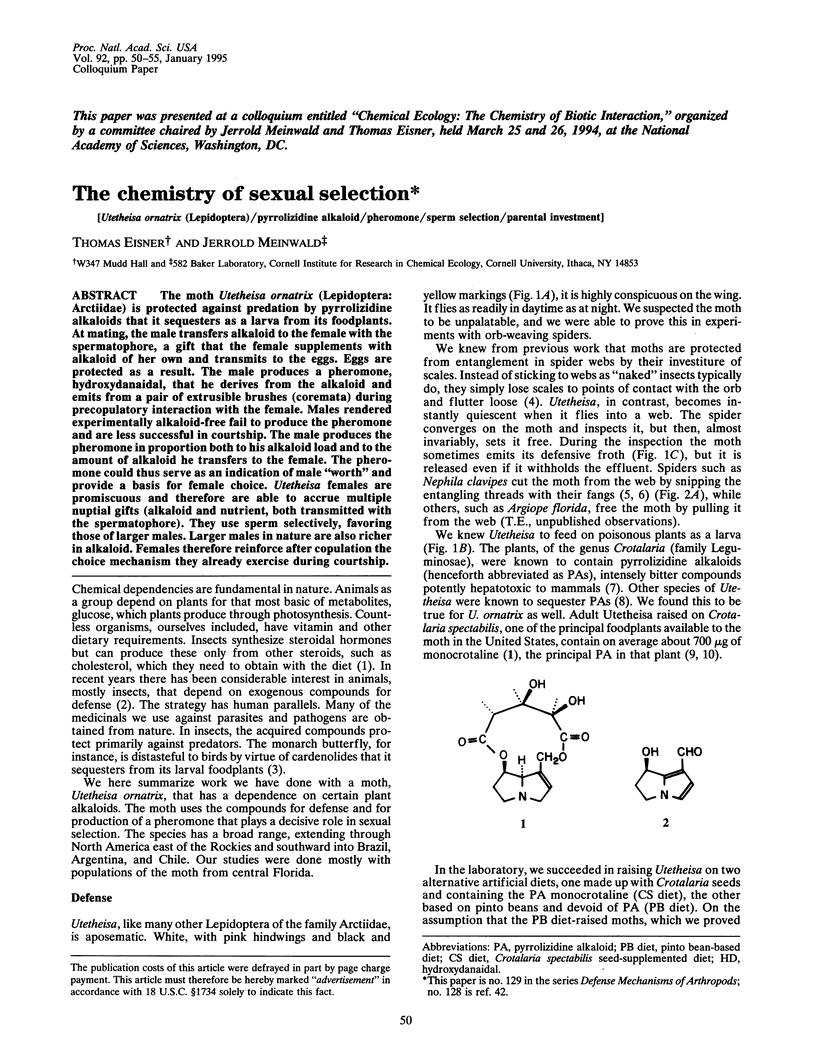
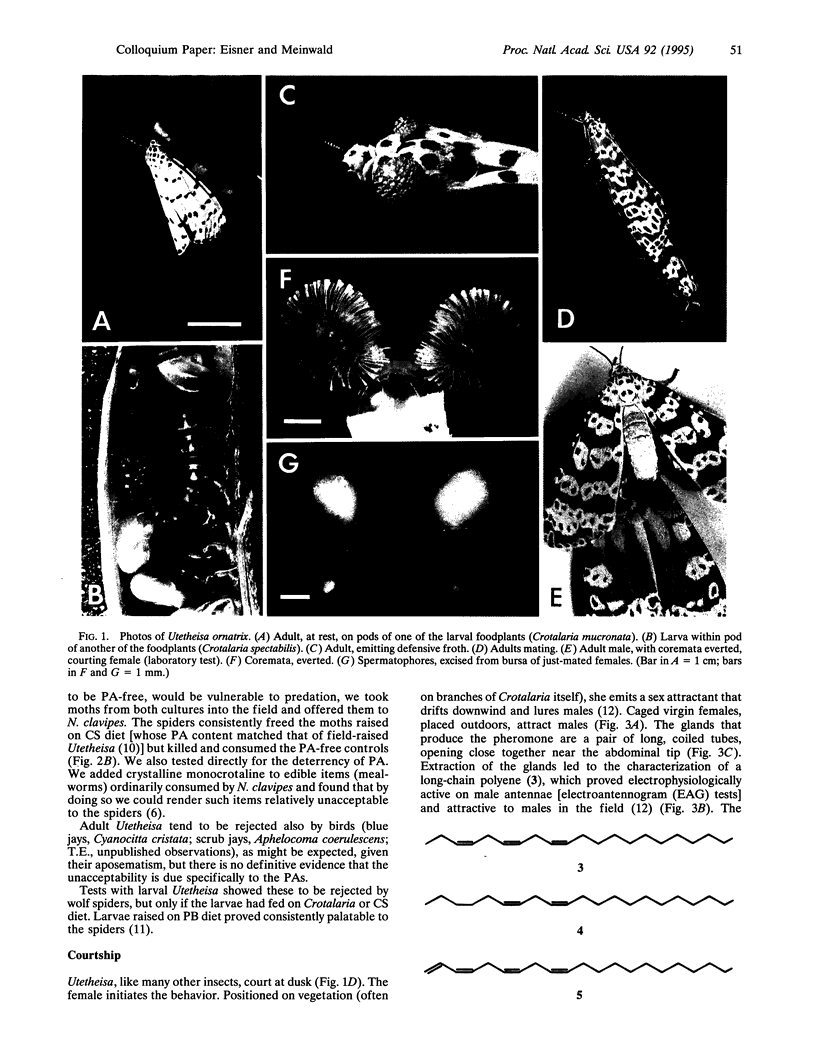
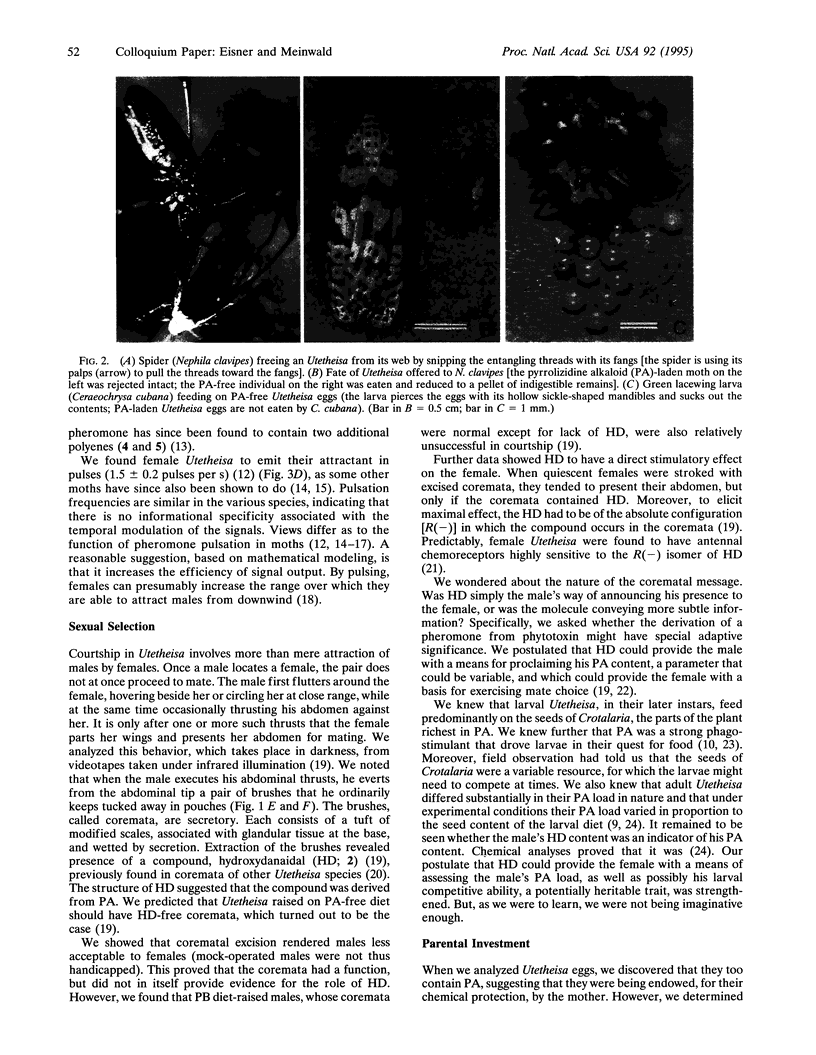
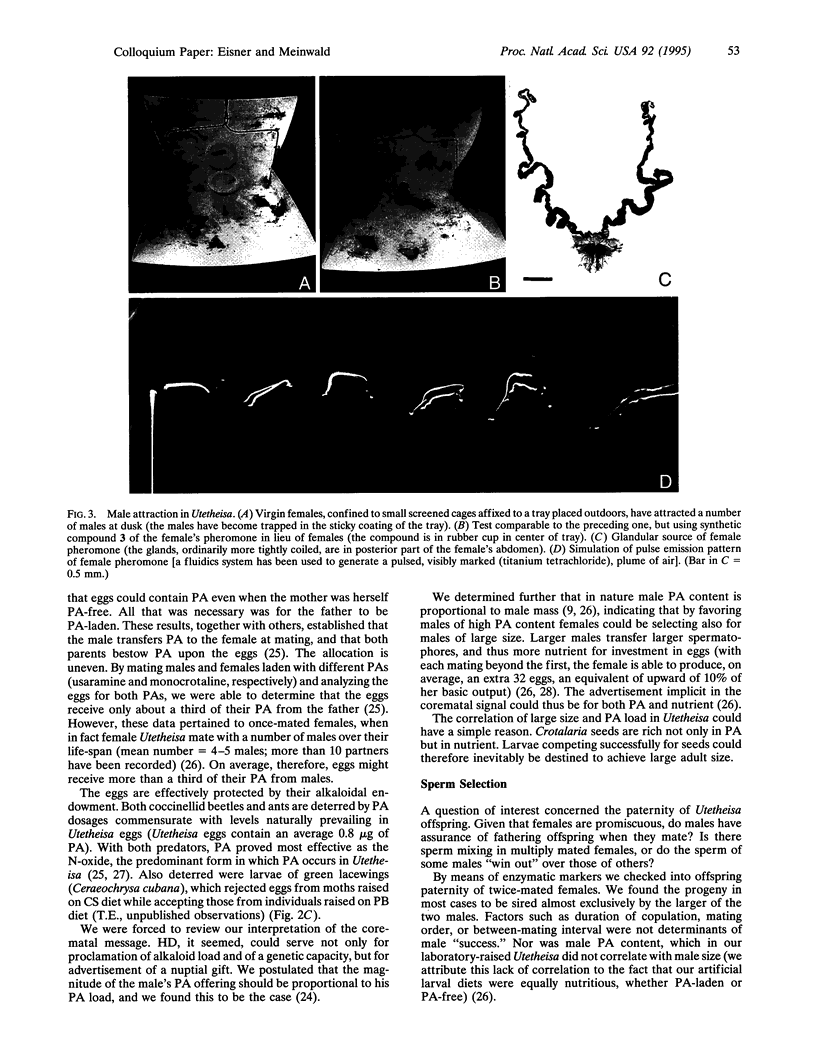
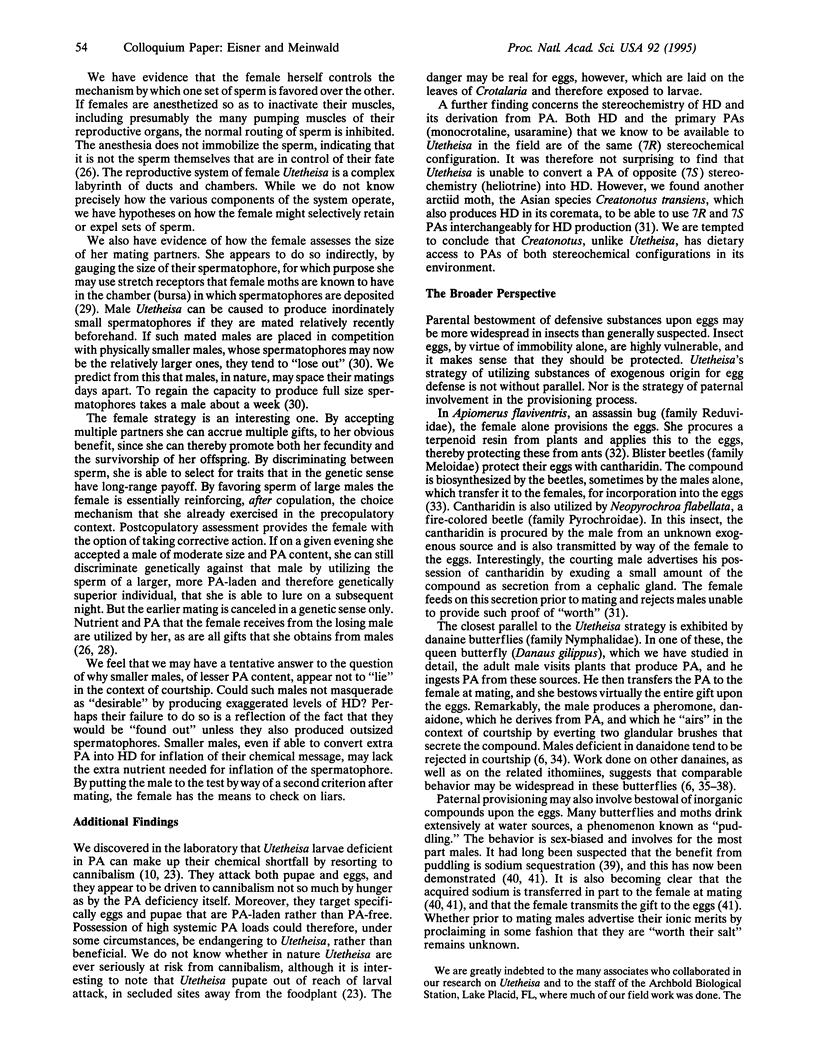
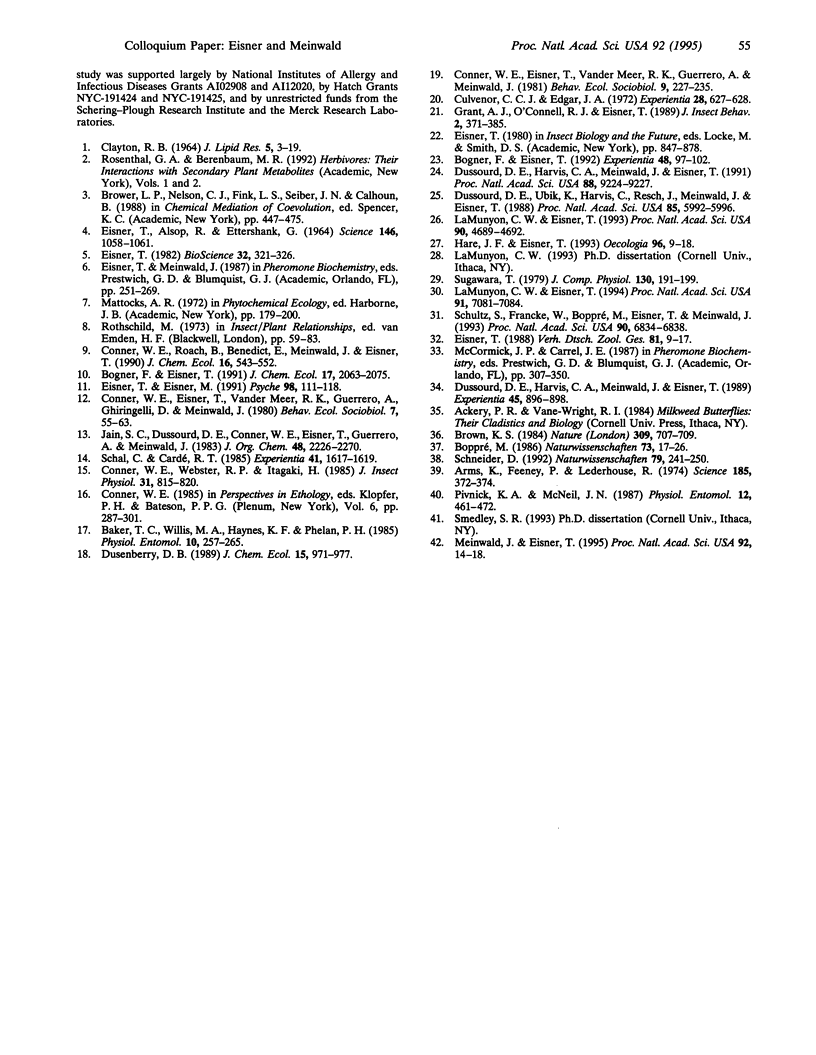
Images in this article
Selected References
These references are in PubMed. This may not be the complete list of references from this article.
- Arms K., Feeny P., Lederhouse R. C. Sodium: stimulus for puddling behavior by tiger swallowtail butterflies, Papilio glaucus. Science. 1974 Jul 26;185(4148):372–374. doi: 10.1126/science.185.4148.372. [DOI] [PubMed] [Google Scholar]
- Bogner F., Eisner T. Chemical basis of pupal cannibalism in a caterpillar (Utetheisa ornatrix). Experientia. 1992 Jan 15;48(1):97–102. doi: 10.1007/BF01923618. [DOI] [PubMed] [Google Scholar]
- CLAYTON R. B. THE UTILIZATION OF STEROLS BY INSECTS. J Lipid Res. 1964 Jan;5:3–19. [PubMed] [Google Scholar]
- Dussourd D. E., Harvis C. A., Meinwald J., Eisner T. Paternal allocation of sequestered plant pyrrolizidine alkaloid to eggs in the danaine butterfly, Danaus gilippus. Experientia. 1989 Sep 15;45(9):896–898. doi: 10.1007/BF01954068. [DOI] [PubMed] [Google Scholar]
- Dussourd D. E., Harvis C. A., Meinwald J., Eisner T. Pheromonal advertisement of a nuptial gift by a male moth (Utetheisa ornatrix). Proc Natl Acad Sci U S A. 1991 Oct 15;88(20):9224–9227. doi: 10.1073/pnas.88.20.9224. [DOI] [PMC free article] [PubMed] [Google Scholar]
- Dussourd D. E., Ubik K., Harvis C., Resch J., Meinwald J., Eisner T. Biparental defensive endowment of eggs with acquired plant alkaloid in the moth Utetheisa ornatrix. Proc Natl Acad Sci U S A. 1988 Aug;85(16):5992–5996. doi: 10.1073/pnas.85.16.5992. [DOI] [PMC free article] [PubMed] [Google Scholar]
- EISNER T., ALSOP R., ETTERSHANK G. ADHESIVENESS OF SPIDER SILK. Science. 1964 Nov 20;146(3647):1058–1061. doi: 10.1126/science.146.3647.1058. [DOI] [PubMed] [Google Scholar]
- LaMunyon C. W., Eisner T. Postcopulatory sexual selection in an arctiid moth (Utetheisa ornatrix). Proc Natl Acad Sci U S A. 1993 May 15;90(10):4689–4692. doi: 10.1073/pnas.90.10.4689. [DOI] [PMC free article] [PubMed] [Google Scholar]
- LaMunyon C. W., Eisner T. Spermatophore size as determinant of paternity in an arctiid moth (Utetheisa ornatrix). Proc Natl Acad Sci U S A. 1994 Jul 19;91(15):7081–7084. doi: 10.1073/pnas.91.15.7081. [DOI] [PMC free article] [PubMed] [Google Scholar]
- Meinwald J., Eisner T. The chemistry of phyletic dominance. Proc Natl Acad Sci U S A. 1995 Jan 3;92(1):14–18. doi: 10.1073/pnas.92.1.14. [DOI] [PMC free article] [PubMed] [Google Scholar]
- Schulz S., Francke W., Boppré M., Eisner T., Meinwald J. Insect pheromone biosynthesis: stereochemical pathway of hydroxydanaidal production from alkaloidal precursors in Creatonotos transiens (Lepidoptera, Arctiidae). Proc Natl Acad Sci U S A. 1993 Jul 15;90(14):6834–6838. doi: 10.1073/pnas.90.14.6834. [DOI] [PMC free article] [PubMed] [Google Scholar]





